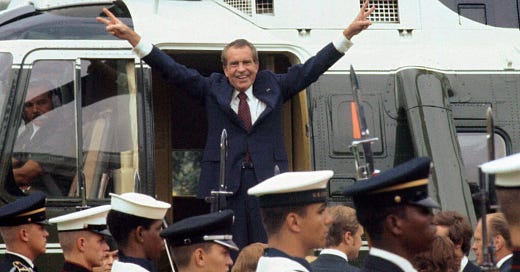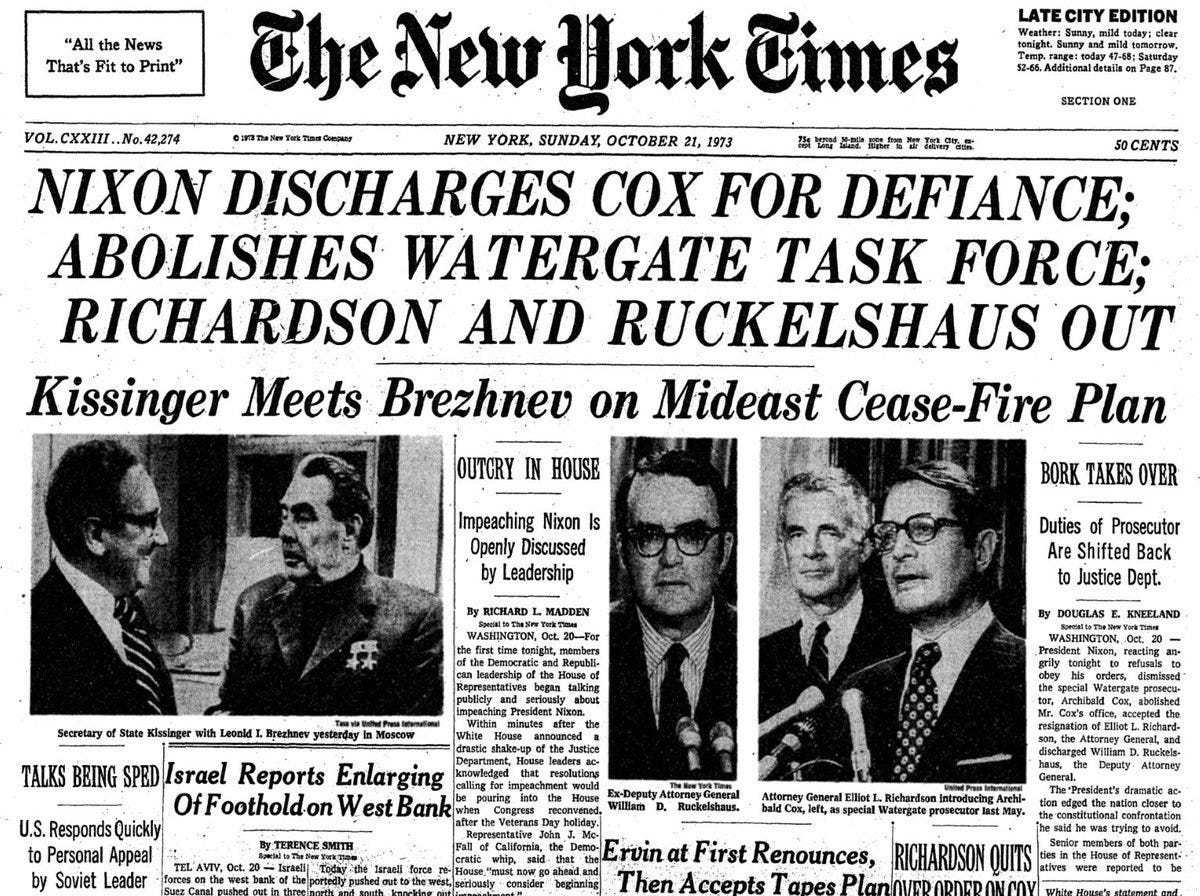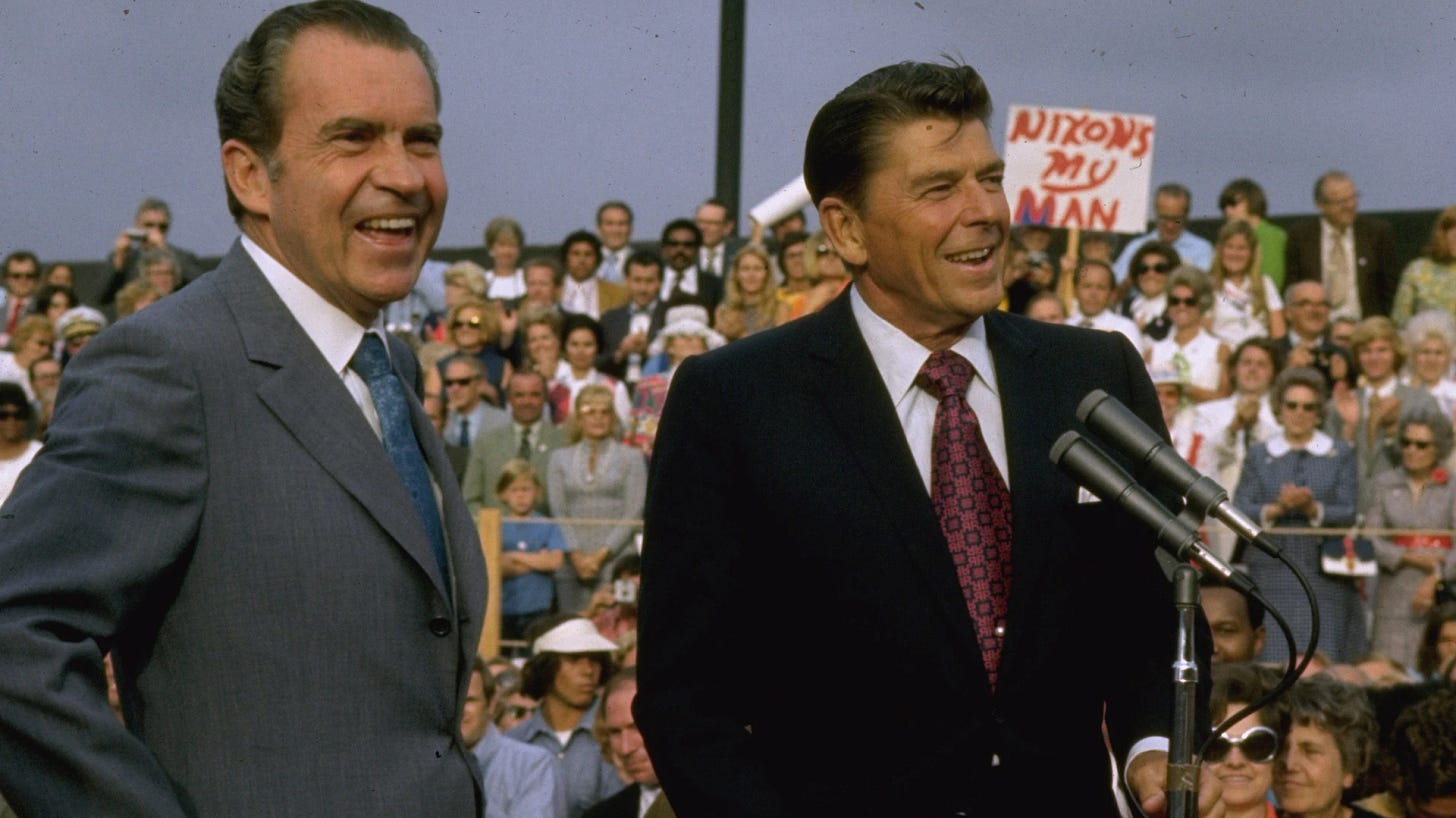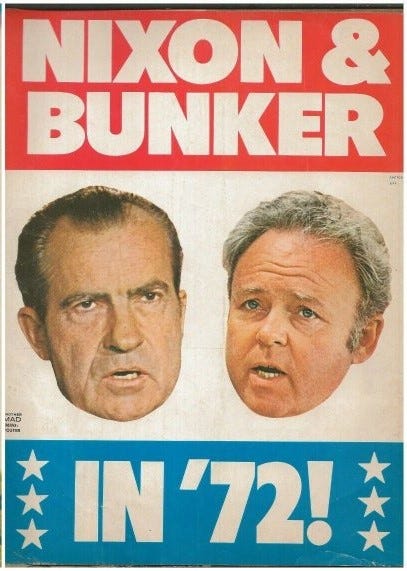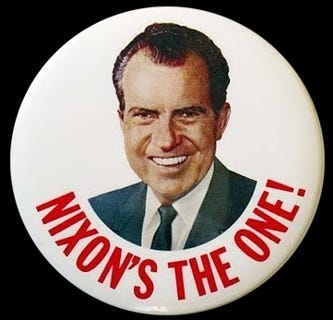***This article uses direct quotations from the Richard Nixon White House Tapes. The language the participants used is offensive and unbecoming of men in their positions. The author uses these quotations to demonstrate that the American people can never send men with these views to the White House ever again.***
August 9, 1974, marks 50 years since Richard Nixon became the only President of the United States to resign the office. At the center of Nixon’s resignation was the discovery of a secret taping system at the White House during the Watergate Scandal. During a June 1973 United States Senate Watergate Committee hearing, former White House Counsel John Dean, (who was fired by Nixon on April 30, 1973, as scrutiny around Watergate intensified) alleged that Nixon was deeply involved with the Watergate break-in and its subsequent cover up. Dean also told the committee that he believed Nixon was taping meetings held in the Oval Office. The possibility of Nixon taping his conversations, which could implicate or exonerate him in the Watergate break in, piqued the committee’s interest, but they had no definitive proof of the tapes’ existence. The Senate Watergate Committee asked every subsequent witness appearing before them if they knew about a recording system in the White House.
On July 16, 1973, Committee staff members questioned Nixon’s former deputy assistant Alexander Butterfield. Butterfield, who had resigned his position earlier in the year to take a job with the Federal Aviation Administration (FAA) was questioned because as White House Chief of Staff H.R. “Bob” Haldeman’s right-hand man, he was the one of the few people who knew the intimate details about Nixon’s schedule. Butterfield confirmed to the Committee and to an audience of millions watching on television that he oversaw the implementation of a taping system in The White House. Most importantly, he revealed every conversation was recorded whenever Nixon was present in the Oval Office. Two days later, White House Chief of Staff Alexander Haig, who became President in all but name as Nixon became more distracted by Watergate, ordered that the taping system be taken offline. The revelation of tapes which could possibly reveal that the President of the United States was at the center of a criminal conspiracy set off a media and political firestorm.
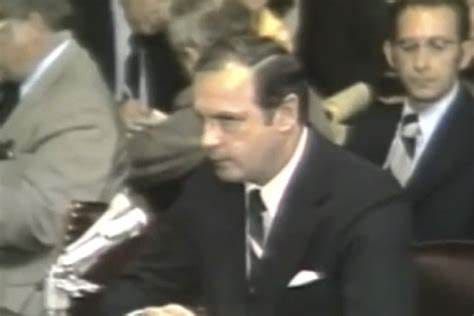
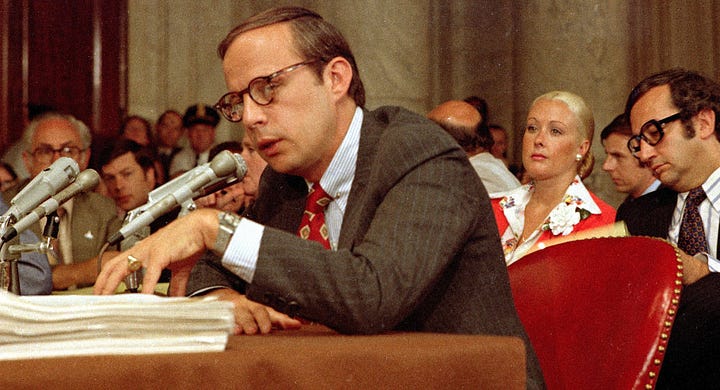
Richard Nixon refused to relinquish the tapes when they were subpoenaed by the Justice Department’s Special Prosecutor Archibald Cox, citing “executive privilege” and claiming the tapes were too important to national security to be released publicly. However, only the tapes relevant to the Watergate break in were subpoenaed. On October 12, 1973, the United States Court of Appeals for the District of Columbia Circuit rejected Nixon’s argument. Nixon's desperation grew more palpable when he proposed that Mississippi Senator John C. Stennis listen to the tapes and then summarize them for Cox. Stennis was partially deaf. Cox rejected Nixon’s offer. This triggered what became known as “The Saturday Night Massacre” on October 20, 1973. Nixon ordered Attorney General Elliot Richardson to fire Cox. Richardson refused and resigned in protest. Nixon then ordered Deputy Attorney General William Ruckelshaus to fire Cox, but he refused and resigned as well. Nixon then ordered Solicitor General Robert Bork to fire Cox and Bork complied. On October 30, 1973, the House of Representatives, incensed by Nixon’s abuse of power, initiated the process to impeach him. Two days later a new special prosecutor was appointed on November 1, 1973, who continued the investigation into Watergate and United States District Judge Gerhard Gesell ruled that Cox’s termination was illegal later that month.
In an 8-0 ruling on July 24, 1974, The Supreme Court ordered Nixon to relinquish the recordings that had been subpoenaed (Justice William Rehnquist, who served as the Assistant Attorney General in the Nixon Administration before his appointment to the Court recused himself). On August 5, 1974, The Smoking Gun Tape was released which confirmed what everyone had come to suspect. The President was a crook. The Smoking Gun Tape was recorded on June 23, 1972, just six days after Watergate. Bob Haldeman is heard telling Nixon that acting F.B.I. Director L. Patrick Gray doesn’t have full control of the agents investigating the break in so would be unable to stifle their investigation on the White House’s behalf. Haldeman reveals to Nixon money found on the burglars had been traced back to the Committee to Re-Elect the President (CREEP). The Watergate burglars were using the money received from CREEP to fund their illegal operations. Haldeman said the plan would be to order the CIA to block the F.B.I.’s investigation into the Watergate burglars on the grounds of national security. Nixon approves of the plan telling Haldeman to “play it tough”. Facing almost certain impeachment from the House and the Senate, Richard Nixon announced his resignation on television on August 8, 1974. His resignation was made official the following day.
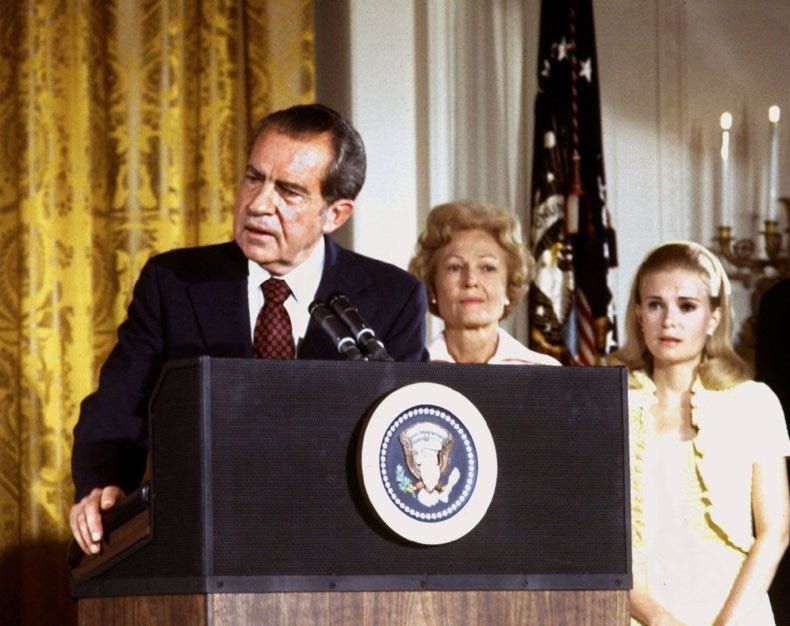
Richard Nixon was not the first President to record his meetings and telephone conversations in the White House. President John F. Kennedy and Lyndon B. Johnson both made recordings as well. It was Johnson who introduced Nixon to the White House recording system during the transfer of power in early 1969. According to Bob Haldeman, Nixon initially disliked the notion of taping any meetings in the White House, but by 1971, he warmed up to the idea after concluding it was the best option to keep an accurate record of his meetings and conversations. However, Nixon had ulterior motives to record his conversations. Nixon believed Henry Kissinger was stealing his spotlight and wanted to ensure there was a record that it was he, not Kissinger who was in charge of America’s foreign policy. The first bugs were installed in the Oval Office and the Cabinet Room on February 16, 1971. Over the next 16 months additional devices were installed in Nixon’s office in the Executive Office Building (EOB), the Lincoln Sitting Room and in the Oval Office, and EOB’s telephones. Nixon’s office and phone at Camp David were also bugged.
However, the taping system installed by members of the Secret Service on Nixon’s orders was entirely different from the system Kennedy and Johnson used. Kennedy and Johnson’s recording systems had to be initiated with the push of a button on their desk or on their phone. According to Haldeman’s aide Larry Higby (who was not implicated in Watergate) the decision was made to implement a system which did not require Nixon to handle the recording technology because in Higby’s words “Haldeman asked to make it voice activated because the President was an absolute klutz when it came to things mechanical”. Instead of pressing a button, the taping system would be activated through Nixon’s Secret Service locator which he always had on his person. Whenever Nixon walked into a room which was wired for sound, the recording system would be activated as soon as the microphones detected a noise. Only Nixon, Haldeman, his aides Alexander Butterfield and Larry Higby, the Secret Service agents who installed the recording devices in the White House, and the members of the Navy who installed the devices at Camp David knew about the taping system’s existence.
An April 9, 1973, recording of a discussion between Richard Nixon and Bob Haldeman reveals that two years after the recording devices were installed, neither man fully understood how their own taping system worked. Haldeman admits to forgetting how the system operated (a member of the Secret Service who handled the tapes presumably gave Haldeman a brief rundown of the system before his meeting with Nixon) and struggles to recall which locations in the White House have been bugged. When Haldeman attempts to explain the minutiae of the system, Nixon shuts him down and says he “would rather not know”.
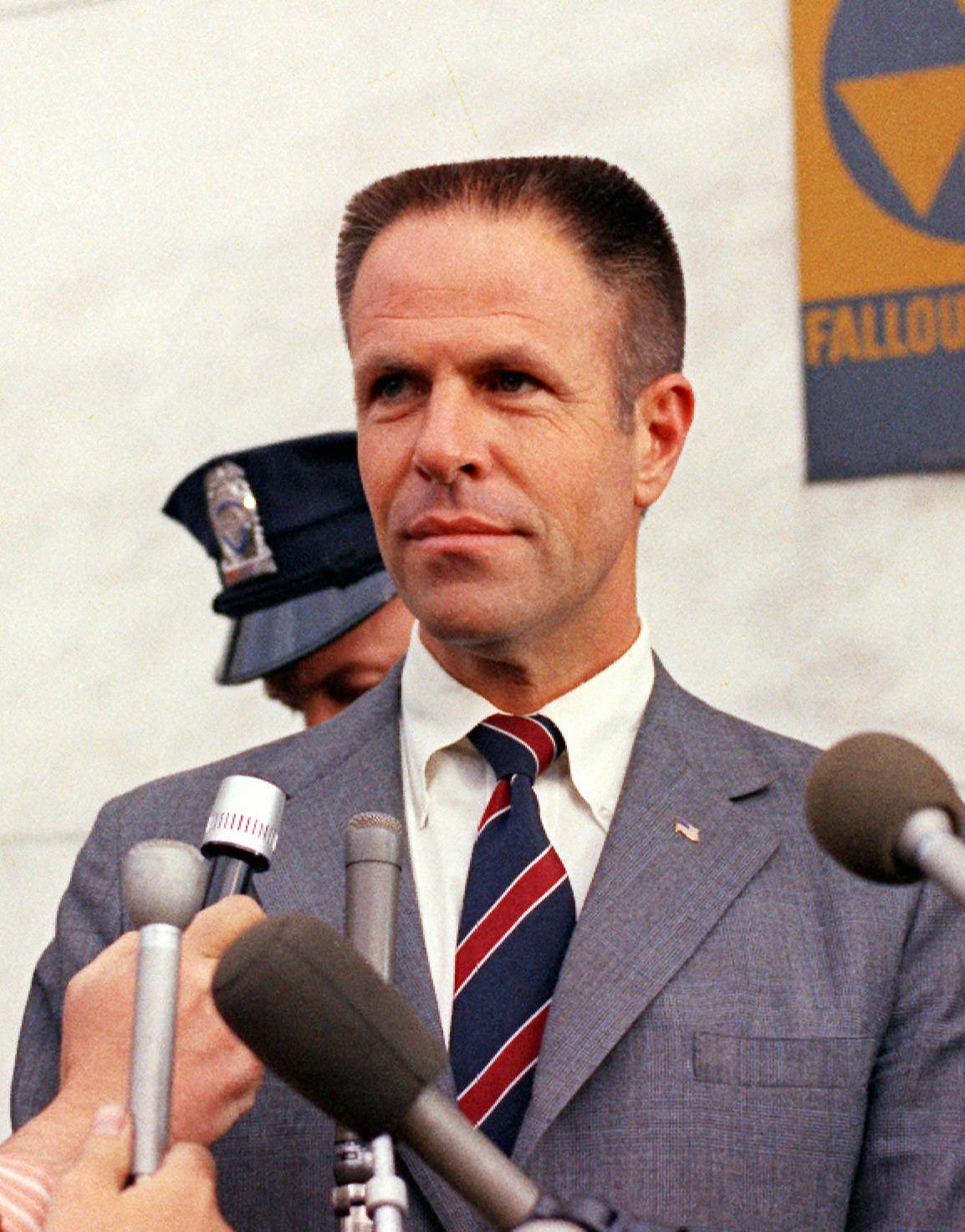
The White House Tapes contain 3,700 hours of recordings which are now the property of the National Archives in conjunction with the Nixon Library. Richard Nixon intended for the tapes to be for his own private use and never thought he would be forced to release them to the public. Nixon planned to use the tapes after he left office to help him craft his memoirs, which he believed would cement his legacy as one of the great statesmen of the 20th Century. The tapes did the exact opposite of that. They destroyed his legacy. The White House Tapes gives the public an unprecedented look into the psychology of an American President. The tapes do not paint a pretty picture of Richard Nixon. The tapes reveal a bigoted man whose ambition was driven by an inferiority complex and paranoia, which brought him to the heights of political power, but caused his downfall.
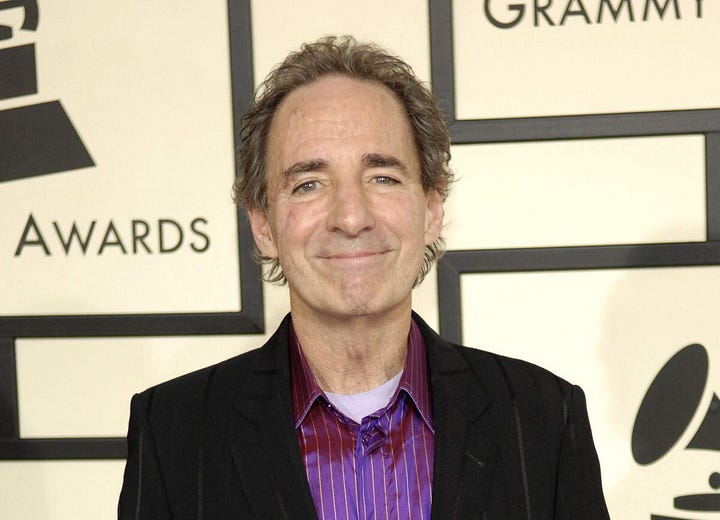

Harry Shearer, best known for his role as Derek Smalls in This is Spinal Tap (1984) and for providing the voices of Ned Flanders, Mr. Burns, and Principal Skinner on The Simpsons (1989), has had a lifelong fascination with Richard Nixon. Shearer grew up in Southern California just as Nixon was beginning his rise as a national figure in the House of Representatives in the same region of California and later would portray Nixon during his time as a cast member of The Credibility Gap comedy troupe during the late 1960s and 70s. Listening to The White House Tapes decades later reinforced Shearer’s view of Nixon as a darkly comical figure. Partnering with Nixon historian Stanley Kutler, Shearer would later reprise the role of Nixon in a miniseries he created called Nixon’s The One (2012). The show is an exact recreation of some of The Nixon White House Tapes most outrageous moments and is shot in a hidden camera style with grainy 1970s influenced cinematography. The series aired on ITV in Britain but was never released in the United States. The rights to the show reverted to Shearer after it aired, and he posted the entire series on YouTube for free. Harry Shearer’s Nixon impression is particularly amusing as he uses the same voice when playing Principal Skinner.
Harry Shearer was right, The White House Tapes feature some of the greatest pieces of American comedy ever recorded. Richard Nixon was unable to engage in small talk because he had no real interest in people, yet he continuously put himself in situations where small talk was required. The tapes feature one awkward conversation after another. On July 5, 1971, Nixon called Florence Dwyer, the first Republican woman from New Jersey to be elected to the House of Representatives to wish her a happy birthday, which was the day before. Nixon regrets making the call as soon as Dwyer starts to speak.
“This isn’t President Nixon, is it?” Dwyer asks.
“Of course!” Nixon responds.
“This isn’t a joke, is it?” Dwyer asks. It’s quite obvious based on how much she’s slurring her words that Dwyer is drunk. Very drunk. Nixon tells her he’s calling her from the Oval Office and says he’ll be going to Kansas City tomorrow to convince Dwyer that it’s actually him and not a prankster.
“This isn’t really for real, is it?” Dwyer asks. Nixon cuts her off and reiterates his birthday wishes. Dwyer proceeds to ramble about a Fourth of July gathering she was at the day before and claims 250,000 people were in attendance, but her words are barely intelligible. Nixon proceeds to spend the rest of the conversation desperately trying to hang up the phone, but Dwyer keeps him on the line. Dwyer tells Nixon that she's with him all the way and that she can’t believe the conversation is happening. Judging by the tone of Nixon’s voice, neither can he. As the conversation winds down, Dwyer once again recalls the Fourth of July gathering, she attended.
“Mr. President, 250,000 people…”
“That’s wonderful.” Nixon says.
“…. were in attendance today and if they don’t if people don’t think that this country doesn’t believe in this country, they played God Bless America at the reviewing stand, I want to tell you you could hear a pin drop.” (Author’s note: This is what Dwyer said word for word.)
Nixon attempts to end the conversation again, but it takes another twist.
“Mr. President, oh my gosh I never had anything happen to me in my life. I think I want to die now.”
“No no no no no. We need you now, you just take care…give everyone up there my best, will you?” Nixon says barely containing his laughter.
Another awkward conversation happened on December 19, 1972, between Richard Nixon and future President Joe Biden. Biden had just won his election to fill Delaware’s seat in the Senate and wouldn’t be sworn in until January 3, 1973. Nixon was calling to offer Biden his condolences for the death of his wife Nellie and one year old daughter Naomi, who were killed in a car accident the day before. Biden’s sons Beau and Hunter, who were just toddlers, were also injured in the accident, but recovered. The conversation starts off pleasantly enough. Nixon does his best to console Biden for his loss, telling him that he and everyone else in the White House are praying for him. Then Nixon proceeds to mention that Biden was on Capitol Hill while his wife was driving their children in the car when the accident transpired. Probably not something Nixon should have mentioned. Nixon also probably shouldn’t have told Biden that he had the “great fortune of being young.”
Richard Nixon’s bigotry along with those of his staff members and other prominent national figures are on full display in The White House Tapes. Nixon wasn’t guarded with his remarks despite knowing he was always being recorded, but of course he assumed only the tapes he selected would be available to the public. The level of racism, antisemitism, misogyny, and homophobia recorded on the tapes will shock even the most cynical set of ears. After The Supreme Court’s Roe v. Wade decision which legalized abortion in America, Nixon discussed the topic with Special Counsel (later Director of the Office of Public Liaison) Chuck Colson (who was the first member of the Nixon White House to be imprisoned for the Watergate Scandal). One would think the President of the United States would have a thoughtful nuanced take on such a divisive subject. Nixon said that while he was personally against abortion, “There are sometimes when abortions are necessary, I know that you know that’s when you have a black and a white.” Chuck Colson quickly adds “or a rape” a sentiment Nixon echoes. Of course, Nixon probably thought that there was no way any interracial relationship could possibly be consensual.
A phone conversation on October 26, 1971, between Richard Nixon and then Governor of California and future President Ronald Reagan is particularly illuminating in its own disgusting way. Nixon and Reagan spoke about the United Nations’ (U.N.) vote to expel Taiwan from the organization and readmit China as a member the day before. Nixon expresses disappointment with the African nations and Iran’s vote against Taiwan saying, “We didn’t get Iran though dammit…you figured there’s the Shah we’ve done all the things for him, but uh these African countries they’re the ones I must say were disappointing.” Reagan expresses outrage at the vote and tells Nixon the United States should leave the U.N. in retaliation but concedes that’s easier said than done. He instead suggests that the United States become a nonvoting member of the organization and use it as a campaign issue for the 1972 election to rally voters and to force Democratic candidates to take a potentially damaging stance on the United Nations. Nixon sympathizes with Reagan’s viewpoint on the U.N. and says he’ll consider his suggestion. Reagan then curses the African nations who voted to expel Taiwan saying, “Those monkeys from those African countries damn’em, they’re still uncomfortable wearing shoes.” Nixon does not condemn or admonish Reagan in any way for his remarks. Instead, he lets out a big hearty laugh and replies “The tail wags the dog there, doesn’t it? The tail wags the dog.”
Ronald Reagan’s supporters were appalled and surprised by his use of racial slurs when tapes of the conversation were released, in 2019. Reagan’s critics and the African American community were not surprised at all. This is the same Ronald Reagan who during the 1966 California gubernatorial race, said “If an individual wants to discriminate against negroes or others in selling or renting his house, it is his right to do so.” This is the same Ronald Ragan who after winning the Republican nomination for President in 1980, held his first campaign event at the Neshoba County Fair near Philadelphia, Mississippi where in 1964, members of the Ku Klux Klan lynched civil rights activists James Chaney, Andrew Goodman and Michael Schwerner. Reagan settled on this location after it was suggested to his campaign by an unnamed Mississippi Republican official, who said it would be the perfect occasion to bring segregationist George Wallace voters into the Reagan coalition. Reagan’s speech in Neshoba reaffirmed his support for “States’ Rights”, a coded term white Southerners had long used to justify segregationist policies. During the 1980 campaign, Reagan made several speeches appealing to white grievances by denouncing “Welfare Queens” and food stamp programs. One part of this speech he would use repeatedly on the campaign trail was how a “strapping young buck” was using his food stamps to “buy a T-Bone steak” while “you (the white voters Reagan was appealing to) were waiting in line to buy hamburger.” Reagan only used the “strapping young buck” line in the South while abandoning it in speeches given in the North.
The White House Tapes also show the depths of Richard Nixon’s antisemitism. Nixon was convinced that Ivy Leaguers and Jews in the Democratic Party, the media, and within the government itself were trying to destroy his presidency and he believed they were using illegal means to do so. These antisemitic convictions were how Nixon rationalized the litany of crimes he and his administration committed. During a July 5, 1971, meeting with Bob Haldeman and White House Press Secretary Ronald Ziegler, Nixon pointed out that the leaker of the Pentagon Papers, Daniel Ellsberg was Jewish. “So, few of those who engage in espionage are negroes. Very lucky that way. And good. As a matter of fact, very few of them become communists. If they do, they either, like, they get into Angela Davis, they're more of an activist type, and they throw bombs and this and that. But the negroes, have you ever noticed? There are damn few negro spies.” Haldeman replied “They're not intellectual enough. Not smart enough.” Nixon agreed with Haldeman saying, “It may be.” Nixon then switches subjects “The Jews are born spies. You notice how many of them are? They're just in it up to their necks.” Haldeman says that Jews have a “devious” quality which makes them more likely to be spies. Nixon goes one step further saying “Well, also, an arrogance, an arrogance that says that's what makes a spy. He puts himself above the law. Other than spies for the pay. I'm talking about the spies that do it because of idealism.” Nixon also conspired against Jewish government employees throughout his tenure as President and he enlisted his inner circle to help him carry out his antisemitic policies. Nixon ordered Haldeman to find out which government agencies employed the most Jews and to put someone “in charge who is not Jewish” who could control them.
Perhaps the most morally repugnant conversation in the Nixon White House took place on May 13, 1971, during a meeting between Nixon, Haldeman, and White House Domestic Affairs Advisor John Ehrlichman (who would later be jailed for conspiracy, obstruction of justice, and perjury charges related to Watergate). Nixon starts the conversation in a charming manner. “I have the greatest affection for blacks, but I know they’re not going to make it for five hundred years”. Nixon then lays out the next fifty years of the Republican Party’s Latino outreach strategy by saying “Mexicans, different cup of tea. They have a heritage. At the present time they steal, they’re dishonest, but they do have a concept of family life, so they don’t live like a bunch of dogs the way negroes do live like.” Ehrlichman chimes in saying “The Mexican American is not as good as the Mexican. You go down to Mexico, they’re clean, they’re honest, they’re moral…you go to the slums and by God they come out with clean shirts on a Sunday.” Nixon is quick to claim that Mexico is more moral because of the church’s influence and because there is less marijuana use (he provides no evidence to back either claim up). However, Ehrlichman corrects Nixon claiming that Mexico’s labor unions are more influential than the church when it comes to policing people’s conduct, something which Nixon, who had numerous unions and labor leaders on his Enemies List, ignores.
Nixon then ventures onto another issue, which fifty years later is still a favorite Republican pastime: complaining about Hollywood. Nixon expresses disgust for an episode of All in the Family (1971) he watched the night before. All in the Family, created by Norman Lear, explored America’s rapidly changing culture through the eyes of Archie Bunker (Carroll O’Connor), a middle-aged working-class man from Queens, who much like Richard Nixon was a narrow-minded bigot. All in the Family tackled hot button topics like racism, feminism, abortion, miscarriages, the War in Vietnam, the hippie counterculture, and religion, which were previously untouched by television sitcoms, making it the most groundbreaking program ever aired. Nixon himself was even the subject of an episode. The episode Nixon that offended so much was “Judging Books by Covers” which addressed homosexuality. Nixon was outraged by the episode for two reasons, he did not believe homosexuality should be “glorified” on network television and Nixon was particularly offended by how Archie’s friend, who is revealed to be gay, is portrayed as an overly masculine man and not an effeminate stereotype. Without realizing it, Nixon describes Archie’s friend in homoerotic terms calling him “handsome, virile, strong”.
Nixon proceeds to go on a homophobic rant saying “I do not think that you glorify on public television homosexuality…any more than you glorify whores. Now we all know that people go to whores…we all have weaknesses and so forth and so on, but goddammit what does that do to kids? What do you think that does to eleven- and twelve-year-old boys when they see that? Why is it that the Boys Clubs, we were there, we constantly had to clean up the staffs to keep the goddamn fags out of it…not because of them, they can go out and do anything they damn please. You know, there’s a little tendency among them all.” Nixon goes on to claim that he is not outraged by the episode for any “moral reason”, but then contradicts himself by saying “I don’t want to see the country go that way.” Nixon then blames the fall of Ancient Greece on their permissive attitudes towards homosexuality, then adding “Sure, Aristotle was a homo; we all know that. So was Socrates.” Ehrlichman then interjects to make an utterly ludicrous remark that Socrates “never had the influence television had.” Nixon ignores him and continues his unhinged rant, which takes a horrifyingly authoritarian and conspiratorial turn. He blames homosexuality for the fall of Ancient Rome saying, “The last six Roman Emperors were fags.” (Author’s note: this is not true). Nixon goes even further and says homosexuality is to blame for the Catholic Church, The British Empire, and French Empire’s downfall. Nixon then makes a claim many American conservatives today have echoed about Russia’s intolerance towards homosexuals. “Now let’s look at the strong societies. Russians? They root’em out. They don’t let’em around. I don’t know what they do with them, but we’re allowing it in this country. Look at this country. You think the Russians allow dope? Hell no! They send’em up! Homosexuality, dope, immorality in general, these are the enemies of strong societies. That’s why the communists and the left wingers are pushing this stuff. They’re trying to destroy us…goddammit we have got to stand up to these people!” Ehrlichman enthusiastically agrees with Nixon calling it “fatal liberality”. Nixon isn’t finished with his rant yet asking “You know what’s happened to San Francisco?” Ehrlichman responds “San Francisco has just gone clear over.” Nixon says “It isn’t just down in the ratty part of town…the upper class in San Francisco is that way. The Bohemian Grove that I attend from time to time…is the most faggy goddamned thing you could ever imagine…I don’t even want to shake hands with anybody from San Francisco.”
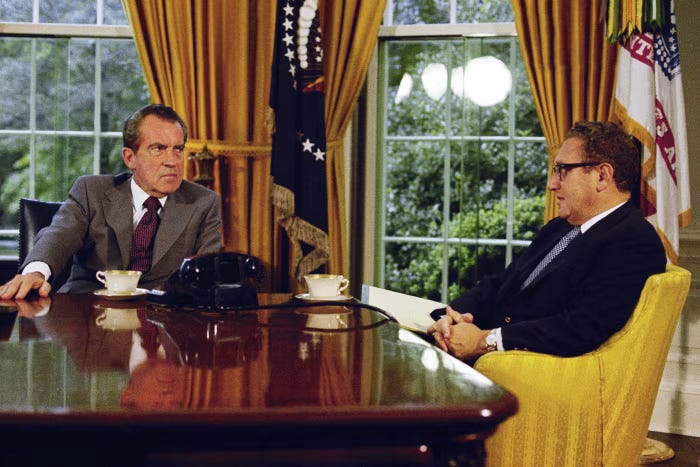
Richard Nixon and Henry Kissinger’s odd couple relationship is also captured on the White House Tapes. Although William P. Rogers was Nixon’s Secretary of State from January 22, 1969 – September 3, 1973, it was Henry Kissinger who was Nixon’s top foreign policy advisor even though he represented everything Nixon despised. Kissinger had a PhD from Harvard where he was a professor, was an intellectual from the Northeastern elite, loved dating Hollywood actresses, and he was Jewish. However, Kissinger knew Nixon disliked him for these very reasons and he was also keenly aware that Nixon’s insecurity made him desperate for praise. To win Nixon’s favor, Kissinger shamelessly flattered him whenever he saw an opportunity.
On an April 7, 1971, tape, Kissinger is heard praising Nixon for his “Vietnamization” speech he gave the day before, telling him it was “the best speech you have given since you’ve been in office.” Nixon shrugs off the compliment saying that his “Silent Majority” speech was better. Kissinger doesn’t let this deter him, he calls the speech “powerful” and “moving” and begins to list the newspapers that gave it a positive review. Nixon cuts him off, replying that he doesn’t “care what the hell the bastards say” which is hard to believe considering that Nixon was obsessed with how the media reported on him. Kissinger then mentions specific reporters who praised the speech at which point Nixon begins to accept Kissinger’s flattery and uses it as an opportunity to talk about his favorite subject-himself, calling the address a “goddamn good little speech. A work of art…that was no act…no actor could have done that. Not even Reagan. No actor in Hollywood could’ve done that that well.” Kissinger agrees with Nixon on every point further adding “No actor could have written it, and you couldn’t have done it unless you had meant it…I had lumps in my throat.” Nixon is still unsure of himself and asks Kissinger for more feedback on how his delivery was. Kissinger gladly massages Nixon’s ego saying, “It was strong, it was dignified, it was not ingratiating.” Nixon lets his guard down further and makes his true feelings known about his inner circle and other elites in Washington to Kissinger “I’m sick of the bunch of them. My Cabinet. The leaders in Congress. What a bunch of assholes…Let me say Henry, you’ve convinced me that aside from Haldeman and one or two others…” Kissinger interjects to mention John Ehrlichman. Nixon corrects himself “Haldeman, and Ehrlichman alright, but as far as the rest of the staff, screw’em. They can do their jobs, but no more. Nothing more.” Nixon then turns the subject to the Vietnam War negotiations led by Kissinger “if this try to end the war idea doesn’t work, I don’t care…we’re going to bomb them right off the earth and I really mean it! And I think you agree with me.” Kissinger reacts to being put on the spot by saying “I think we have to make fundamental decisions.”
Henry Kissinger did not learn of the taping system’s existence until the Spring of 1973, and he immediately understood the full implications of the tapes’ release beyond Watergate. Kissinger told John Ehrlichman, who learned of the tapes shortly before he was fired, “We are going to look like perfect fools when all of the tapes are released. Nixon will be heard delivering his tirades, saying all sorts of outrageous things and we will be sitting there quietly, not protesting or disagreeing. You and I know that’s how we had to do business with him, but we will be judged harshly.”
Richard Nixon’s feud with the media and his inferiority complex is also captured on the White House Tapes. Nixon utilized the television media masterfully in the now infamous “Checkers Speech” on September 23, 1952, when he was still a Senator and nominee for Vice President where he defended himself against allegations that he used funds provided by donors for his own personal use. Nixon claimed he never used money from the funds for any illegal or unethical purposes, but added a donor gifted his family a cocker spaniel that his daughters named Checkers and they would not be giving him back. The speech galvanized the public’s sympathy and saved Nixon’s spot on the Eisenhower ticket. Nixon could never quite get a handle on the media again for the remainder of his political career. During the first ever televised Presidential Debates on September 26, 1960, the viewing public was more focused on Nixon's stubble and sweaty face than on anything he had to say. Historians would later claim that Nixon’s dreadful appearance contrasted with John F. Kennedy’s youthful aura during the first debate and was one of the reasons why he lost the 1960 Election, one of the closest elections in American history. Yet in 1968, Nixon made one of the greatest comebacks in the history of American politics and won the Presidency. Winning the 1968 Election should have cured Nixon’s inferiority complex, but that wasn’t the case. The chip on Nixon’s shoulder was the size of Mount Everest when he took office on January 20, 1969.
Nixon’s resentment towards the media and his predecessors is on full display during a January 3, 1973, conversation with Henry Kissinger where he lamented how the press never ran editorials suggesting that John F. Kennedy or Lyndon Johnson invite him to the White House either socially or to seek his advice as a former two term Vice President. Nixon also complains that neither Kennedy nor Johnson took it upon themselves to invite him to the White House or consult him. Kissinger of course sympathizes with Nixon saying Kennedy and Johnson showed a “lack of compassion”.
Nixon’s escalating feud with the media during his presidency is one of The White House Tapes’ defining themes as they demonstrate how his burning hatred for them only grew stronger as scrutiny over the Vietnam War and Watergate intensified. In a September 14, 1971, meeting with Bob Haldeman, Nixon brings up a recent conversation he had with Henry Kissinger where Kissinger suggested he give an interview with The New York Times’ James Reston. The New York Times was the newspaper Nixon had grown to despise the most and their publishing of the “Pentagon Papers'' only strengthened his resolve to destroy them. Nixon tells Haldeman that he told Kissinger that in no uncertain terms would he ever agree to be interviewed by The New York Times. Nixon says he will only do interviews with reporters who are friendly to him and the Administration. Nixon then tells Haldeman “I want the goddamn staff to understand…that the blackout on The Times is total.” Nixon instructs Haldeman to reiterate this point to Kissinger. He then says the “…same’s true of Time and the same is true of Newsweek.” Nixon later says The Los Angeles Times and The Washington Post are part of his media blackout as well.
Even Richard Nixon’s own family became a part of his war on the press. During an October 7, 1971, conversation, Nixon tells First Lady Pat Nixon he will be skipping White House Correspondent Helen Thomas' wedding to avoid the press and suggests Pat and their daughter Julie go in his place, which she agrees to. In an August 16, 1972, conversation with Bob Haldeman, an irate Nixon expresses frustration with a television interview Pat Nixon gave to CBS. He was upset that the reporter asked questions about the “Checkers Speech” and not about her work as First Lady. Nixon tells Haldeman the interview was a “son of a bitching inquisition” and orders him to cancel Henry Kissinger’s planned interview with CBS as retribution and to offer NBC the opportunity to interview him instead. Nixon’s hatred for the press drove him to the point where he mused about destroying the networks by refusing to let the burgeoning cable industry expand during a November 2, 1971, discussion with Haldeman. However, Haldeman suggests using campaign funds to start a news network of their own with the implication this network would produce Nixon friendly news and programming.
As each one of The White House Tapes were released to the public, they demonstrated how Richard Nixon used the Presidency to consolidate his own power and usurp the rule of law instead of serving the American people. When President Gerald Ford pardoned Nixon before he could be charged with a crime, a decision which looks more cowardly and disastrous by the day, it was up to the very media and elite institutions Nixon hated to shun him and keep him in political exile. Instead, these institutions allowed Nixon to use them to rehabilitate his image as a dignified elder statesman. Nixon gave speeches at the same elite universities he’s on tape lambasting. He was interviewed to give his opinions on the latest in politics on network television by the likes of Barbara Walters for 20/20 and Ted Koppel for Nightline. These were all the same networks Nixon is on tape vowing to destroy for covering him and his administration accurately.
When Richard Nixon died on April 22, 1994, he should have been buried alongside his wife in the corner of a Southern California cemetery that no one’s ever heard of, with just his daughters and their families in attendance to be forgotten forever. Instead, his effort to con the world into viewing him as an elder statesman worked. His former Vice Presidents Spiro Agnew and Gerald Ford were in attendance. Henry Kissinger delivered a eulogy which paid tribute to the man he had so much mutual respect and contempt for, Senate Majority Leader Bob Dole was on hand as well and cried at the end of his eulogy. Former Presidents Jimmy Carter, Ronald Reagan, (making his last public appearance before his Alzheimer's diagnosis was revealed later that year), and George H.W. Bush also attended. Then President Bill Clinton also attended and gave a eulogy of his own. Secretary General of the United Nations Boutros Boutros-Ghali, Vice Premier of the People's Republic of China Zou Jiahua, Deputy Prime Minister of Russia Alexander Shokhin, Minister of Foreign Affairs of Canada Lloyd Axworthy, former Prime Minister of the United Kingdom Edward Heath, former Prime Minister of Japan Toshiki Kaifu, and former President of Israel Chaim Herzog were also in attendance.
Richard Nixon’s funeral was officiated by famous American evangelist Reverend Billy Graham. Graham called Nixon “one of the most misunderstood men, and I think he was one of the greatest men of the century” during his eulogy. Richard Nixon and Billy Graham are on the White House Tapes making anti-Semitic remarks. On a February 10, 1972, tape, Graham told Nixon that Jews had become too powerful in the United States and that “this stranglehold has got to be broken or the country's going down the drain.” Nixon responded, “I can't ever say that, but I believe it."

